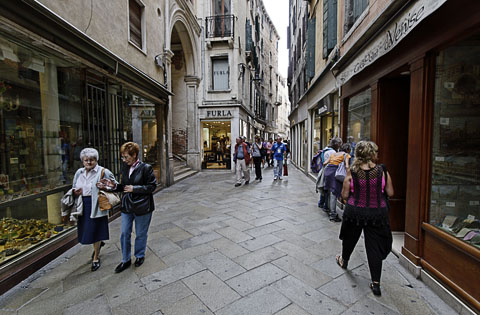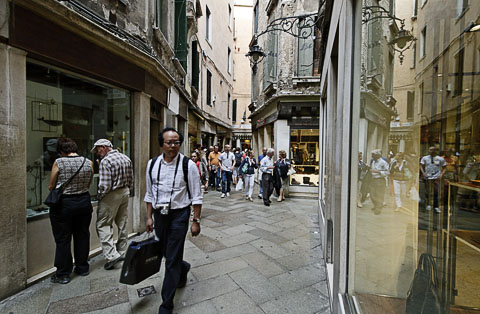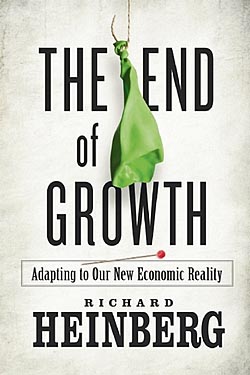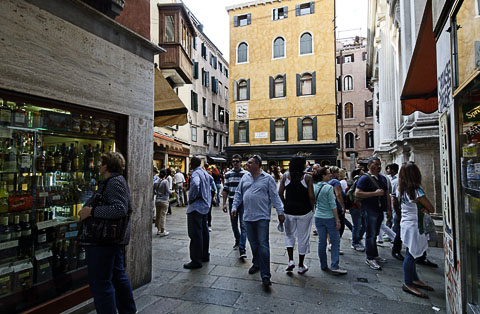
|
||
|
Issue 69 |
|
3 March 2013 |
 Venice 2012 J.H. Crawford AnnouncementsVideoI have kept busy editing video this winter and have also bought a new and better video camera that I will be taking to Portugal, Scandinavia, and the Netherlands in May. I am preparing a script for my first long video, provisionally titled "Deep Green." It will be about 25 minutes long.About 30 videos are now on line and have accumulated over 20,000 total views. You can find them all here: Vimeo (recommended) YouTube (not all videos are here) However, the best way to watch is probably to use my new Channel at Vimeo: which allows me to present the newest and best videos first. If you watch a video, please Like it by clicking the Heart icon in the top-right of the video frame (Vimeo) or clicking the Thumbs Up icon below the video (YouTube). Posting to Twitter and Facebook will also help if you can. We need to get the message out to a broader audience. I know this is a bit of a nuisance, but it really does make a difference. The 20,000 views needs to become 20,000,000 views as quickly as possible. I need your help with this.
|
|
|
The BooksCarfree Cities and Carfree Design Manual are widely available in Europe and North America.World Carfree NetworkCarfree.com actively supports World Carfree Network (WCN). The main news from the network follows. The network stands at the point of some degree of renewal and rebirth and could use your help if you have time available.World Carfree NewsWorld Carfree News is now available in Czech, English, French, German, Italian, Portuguese, and Spanish. It's published monthly and is a great way to keep abreast of important developments in the carfree cities network. Read the latest issue. |
|
 Venice 2012 J.H. Crawford News BitsThe links below will open in a new browser window (crtl + left-click to open in a new tab instead): Thanks to all who suggested articles, especially Richard Risemberg of Sustainable City News, who is a prolific contributor.
Big News
"Heart and the City: Environment and Heart Disease" (PDF!)
"America's Real Criminal Element: Lead"
"Autism and Air Pollution: The Link Grows Stronger"
"Secret funding helped build vast network of climate denial thinktanks: Anonymous billionaires donated $120m to more than 100 anti-climate groups working to discredit climate change science"
"Richard Risemberg of GRID Logistics"
Good News"Cargo Bike Crazy: The Potential of Delivering Goods By Bike"
"How Bicycling Is Transforming Business"
"Life Without Cars: 2012 Edition
"
"10 Techniques for Making Cities More Walkable"
"Lessons From Zurich's Parking Revolution"
"Proposal for Urban Regeneration of the Suburb ZEN, Palermo, Italy"
"No Parking Required in Mixed-Use Plan For Cornfield Area"
"Back to the future: building homes for people, not cars"
"German children enjoy far more everyday freedom than their English peers"
"Synthetic molecule stores solar energy"
Bad News"As Biofuel Demand Grows, So Do Guatemala’s Hunger Pangs"
"Car pollution, noise and accidents 'cost every EU citizen £600 a year': Researchers challenge view that drivers are overtaxed, saying they are subsidised by other taxpayers"
"Drivers Cover Just 51 Percent of U.S. Road Spending"
"Beijing is not the only Asian city with lethal air pollution: The Chinese capital is just one of hundreds of cities where poisonous air is the fastest growing cause of death"
"L.A.'s Bloody Hit-and-Run Epidemic: The city ignores a crisis of car-as-weapon crime in the streets"
"Big Dig pushes bottlenecks outward: Artery has cleared, but commutes longer on several major routes"
"Cars and Robust Cities Are Fundamentally Incompatible"
Awful News"Scientists Confirm: Arctic Sea Ice 'Collapse' at Our Door: Warming planet and new evidence portend future of ice-free Arctic"
"Arctic lost record snow and ice last year as data shows changing climate: Findings from US science agency NOAA suggest widespread and irreversible changes because of a warming climate"
"Antarctica, Greenland ice definitely melting into sea, and speeding up, experts warn"
"Melting Glaciers in Andes Could Spell Continental Water Crisis in South America: Climate change is driving 'unprecedented' shrinking of crucial resource"
Resources
"Celebrating the Commons" (PDF!)
"Matthew Bronski on design and construction durability"
Book Review
One mantra down, one to go It is growing increasingly difficult to pretend that nothing is wrong with the current state of affairs in the world. Economic stagnation has continued for years in many countries. The crises in Greece and other European countries have shaken the European Union. Unemployment in the US remains high, far higher than official rates. And then of course there are the increasingly visible signs of climate change. There will always be those who refuse to connect the dots or who point to exceptions to "prove" that nothing is wrong. China's economy is still growing, so presumably if other countries were willing to turn their country into an industrial wasteland and ignore workers' rights, they too could prosper (at least over the short to medium term). Not all countries are going bankrupt, so the fact that some are simply indicates that their governments are too generous in social spending (!!) or that they are otherwise mishandling "the economy." But others have long questioned the paradigm of economic growth. For example Jane Jacobs, more famous for her books on urbanism but who also wrote of economics, noted that, denials aside, economies follow the laws of nature. An obvious law of nature is that continual growth is not possible. Perhaps it is that simple, basic fact that most succinctly disproves the hope of technology ending our woes. But for those of us who wish to bolster our arguments, a bit more than an incontrovertible (if often unacknowledged) law of nature is needed. This is where I found Richard Heinberg's book The End of Growth most helpful. He lays out a number of arguments, backed up by figures, as to why, whatever our feeling about economic growth as a sensible target, it is no longer an achievable one. In fact, his key thesis is startling even to those of us who object to the economic growth mantra: he posits that we have already, in terms of the world as a whole, reached the end of growth. Individual countries and regions may continue to grow as measured by GDP, but for the world as a whole, we will now face stagnation and even decline. All the interesting details aside, the simple reason is that growth was predicated on a seemingly endless supply of cheap fuel; with fuel dwindling in supply and growing in price, growth is no longer achievable. Fortunately the book does not stop at such issues as pointing out the problems of "low hanging fruit" (we've already accessed the easy natural resources, so it will require increasingly more energy and often water to access what is left), of "peak everything" (we're running out of all sorts of resources, not just oil) and the fallacies of assuming that our endless ability to innovate and economize will allow growth to continue (as Heinberg points out, efficiency can only get us to a certain level; you can't reduce costs below zero). Helpful as those arguments are in countering the economic growth mantra, they also leave the reader depressed about the future. It is difficult, after reading his book, to smile at your friends who complain about not finding a job and say "Things will get better." When people complain about their debts, it is rather tempting to say "It will only get worse." But Heinberg does present the positive side of the equation as well, in terms of the need to build stronger communities and to become more resilient and capable in order to deal with the many problems (but also opportunities) that we will soon face. He presents, in brief, various possibilities to maintain or even improve wellbeing while facing a steady state or declining economy, including a resurgence in cooperatives of various types and the use of debt-free currency. (Debt-free currency overcomes the need to have economies grow in order to be able to afford to repay interest on loans; the way we generate money through loans is at the root of the problem of economic growth.) While I greatly appreciated the information in the book and his attempts at a (guardedly) optimistic approach, I do have quibbles with several parts of his book. He seems to feel that overpopulation is more of a problem than overconsumption, which suggests that he wants Americans to be allowed to continue, at least for the short-term, their lavish lifestyles by keeping immigrants out of the country. He seems to feel that electric cars are environmentally friendly and barely mentions transport in his solutions. When he does get around to talking about transport, he mentions not only bicycle co-ops but also car-share and ride-share, as if even someone brave enough to counter the dominant world belief in economic growth lacks courage when it comes to questioning the equally disastrous international obsession with the automobile. A few pages from the end he finally gains chutzpah enough to ask: "Can we surrender cars, highways, and supermarkets, but still keep cultural exchange, tolerance, and diversity, along with our hard-won scientific knowledge, advanced healthcare, and instant access to information?" Relieved as I am that he finally puts those words on the page, I wish he had dealt with the possibility earlier in the book and at more length. I suppose there is some comfort in knowing that those of us who believe in the possibility, nay, necessity and inevitability of carfree cities are considered remarkably brave, but it would be a heck of a lot easier to work towards them if the people laying out the arguments for why our current lifestyles must change dramatically would themselves help to carry the torch.
Debra Efroymson is Regional Director for HealthBridge,
a Canadian NGO which in addition to its more traditional public health programs also works on Liveable Cities. Debra has lived and worked for 19 years in Asia and has spoken and written extensively on issues of non-motorized transport, liveable cities, and carfree urbanism.
Back to Carfree.com
E-mail
|

